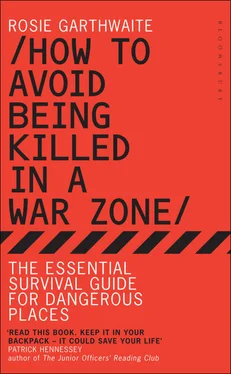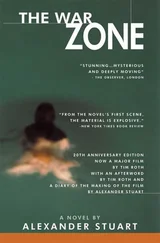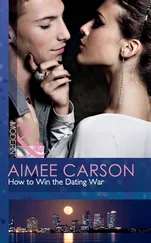Kathleen McCaul, journalist, formerly at the Baghdad Bulletin , now a freelance radio and TV producer, and author of Murder in the Ashram (Piatkus, 2011).
Laura McNaught, freelance film-maker and founder of Sam’s College Fund for children in the developing world.
Leith Mushtaq, senior Al Jazeera cameraman.
Monique Nagelkerkehas worked for Médecins Sans Frontières for 20 years and currently travels the world as a head of mission. Her last four posts were in Liberia, south and north Sudan, and Papua New Guinea.
Rageh Omaar, news presenter for Al Jazeera English, has covered over 15 conflicts and 40 countries for the BBC and other broadcasters. He was nicknamed the ‘scud stud’ of the Iraq war in 2003.
Mary O’Shea, former staff member with both the EU and UN, now working for them on a freelance basis as a governance and human rights specialist.
Leigh Page, freelance documentary-maker and poker pro from Cape Town.
Jacky Rowland, correspondent for Al Jazeera English. Her 16 years of covering conflicts in the Balkans and the Islamic world have won her several awards, including the Royal Television Society Award in 2001. She joined Al Jazeera from the BBC, where she held a number of high-profile foreign postings.
Nazanin Sadri, producer for Al Jazeera English.
Mike Sawatzky, Congo bush pilot and volunteer at the Goma-based charity Kivu Kids ( www.kivukidsfoundation.org).
Imad Shihab, Iraqi journalist, once driven underground because of his courageous reporting, is now out of hiding and working for the BBC Arabic channel as an occasional reporter.
Subina Shrestha, journalist and film-maker based in Nepal; nominated for a Rory Peck Award for her work undercover in Myanmar after cyclone Nargis hit in 2008.
John Simpson, world affairs editor and long-time senior correspondent at BBC News. He has reported from around 30 war zones, winning an International Emmy award for his work, and has written a number of books, most recently Unreliable Sources (Macmillan, 2010).
Jon Snow, chief presenter, Channel 4 News in the UK.
Peter Stevens, freelance newsman.
Jon Swain, journalist, writer and one-time recruit to the French Foreign Legion, has worked as a correspondent for the Sunday Times for 35 years. His bestselling River of Time (Heinemann, 1995) was the book that made me want to be a journalist.
Sherine Tadros, correspondent for Al Jazeera English, was one of only two international television journalists broadcasting from inside Gaza during the 2009 war.
Shelley Thakral, senior news producer for BBC World, who has covered Iraq, the Indonesian tsunami, the Pakistan earthquake, Benazir Bhutto’s assassination and a dozen other disasters and war zones.
Nick Toksvig, former foreign editor at Sky News, and now a senior news editor for Al Jazeera English.
Giles Trendle, spent over 10 years in Beirut reporting for, among others, the Economist , the Sunday Times , CNN and CBS radio. He became an award-winning film-maker and now heads up a part of the programming department for Al Jazeera English.
Laura Tyson(née Conrad) worked for Save the Children and is a former senior media officer at the Department for International Development.
Terry Waite, CBE, conflict negotiator and former hostage.
Sebastian Walker, journalist for the Baghdad Bulletin , then Reuters and Al Jazeera; covered the Haiti earthquake in January 2010.
Sue Williams, a trained hostage negotiator since 1991 and former regular contributor to meetings of COBRA, the UK government’s emergency taskforce, while head of the Hostage Crisis Unit at New Scotland Yard.
Vicki Woods, contributing editor at US Vogue and columnist for the Daily Telegraph ; mother of my colleague and friend Sebastian Walker.
1/ Planning, Preparing and Arriving
Never go in blind. Don’t move until you know everything about where you are going.
Leith Mushtaq, senior Al Jazeera cameraman
I was very unpreparedfor my trip to Baghdad. For a start, I thought I was going for six weeks, but ended up staying for five and a half months. This was no holiday: there were things I should have sorted out before I left, but just didn’t.
You need to take control of your own destiny. Don’t go along for the ride. You need to have thought through all the risks before you go in, and made sure you have done everything possible to minimize them.
You need to keep your family or friends informed and get them involved in your preparations.
Here is a list of stuff you need to think about before you go, but I’m sure others will offer useful suggestions too.
Prepare your grab bag(see Grab Bag YOUR GRAB BAG MUST INCLUDE…
).
Begin your medical preparations – ideally about six weeks before you’re due to leave. You need to find out if you should be taking any pills or having any vaccinations. Go to your local doctor or a reputable travel website to find out which ones.
Dr Carl Hallam, MSF volunteer and former British Royal Marine doctor, advises: ‘Get yourself vaccinated for everything possible. Don’t die from something you could have been saved from. I was shocked to find workers in Aceh in Sumatra who had not been vaccinated for rabies. I think that’s crazy. One little prick in the arm can save your life.’
Pack at least a month’s supply of any prescription medicationrequired. Carry it in your hand luggage.
Pop into the dentist for a check-upif you are going to be away for more than a few months.
Get decent medical insurance, making sure you have cover for your destination country, and check if your activities there require any extra cover. Make a separate note of how to contact the insurers in case of an emergency. Put your insurance contacts along with your medical history somewhere you can easily find it.
Prepare a medical kit, or check your old one for ‘best before’ dates (see Your Medical Kit).
What kind of contraception would you like to take?Even if you think you won’t need it, take some for your friends. Condoms are valuable things in a war zone (see Condoms).
Find out your team’s pre-existing ailments and allergies.If you are travelling with a team of people, you need to know where they keep their medicine and how to administer it if they can’t do so themselves. Everyone should write down their medical history and everyone should know where that is kept.
Choose your next of kin, and remember that whoever you choose needs to be asked rather than told. You need to give them all your details: medical history, insurance details, bank account numbers, where your will is kept (if you have one), the password to get into your safe… anything they’d need to know if something goes wrong. It isn’t morbid to do this. Next of kin are a first port of call in an emergency, such as your kidnapping or arrest, not just in the event of death. Don’t leave them unprepared.
In my experience, tragedies happen at the worst times: your primary contact – news editor, producer, partner – must have immediate and 24-hour access to your next of kin and medical details.
Читать дальше




![Джонатан Димблби - Barbarossa - How Hitler Lost the War [calibre]](/books/385421/dzhonatan-dimblbi-barbarossa-how-hitler-lost-the-w-thumb.webp)







